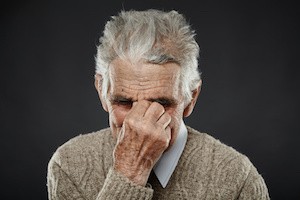
Experiencing a traumatic life event means experiencing grief. You can grieve the loss of a spouse, family member or friend. Moving house or city can cause grief. A major family feud, retirement, or a difficult diagnosis all can too. Grief is both a physical and emotional event – it is exhausting on all levels, but it is a process which does resolve itself, even if you feel different afterward.
Depression is another matter. Sometimes depression is mistakenly thought of as a natural part of growing old. Though depression can be an understandable reaction to loss, it is not an inevitable part of life in older age. Depression can be prevented and effects can be minimised when it’s recognised and treated appropriately. It is also alarmingly common – one in seven New Zealanders will experience it at some point in their lives.
People experience depression in different ways. Depression is not the same as sadness or grief. In fact, not everyone who suffers from major depression complains of sadness, though they do acknowledge not being their usual selves. People experiencing depression for the first time often comment that it is not what they thought depression would be like.
Those who have experienced both grief and depression say the two felt quite different. Those experiencing grief emphasise the sadness, while those experiencing depression emphasise a lack of motivation and pleasure, a physical and mental
slowing and difficulty thinking as clearly as usual.
Depression ranges in severity from mild to severe and may come on gradually or quite quickly. Sometimes a person may experience a chronic low grade depression over a long period of time. They may appear gloomy, withdrawn, lethargic, with low self-confidence and little pleasure from life. While this depression is not as severe, it still may have a significant effect on life and put people at risk of harming themselves.
How do I recognise the difference?
Depression can present differently in older people and often goes unrecognised. Some of the symptoms of depression are similar to common physical illnesses. For example, loss of appetite or disturbed sleep may be due to depression or to heart disease or arthritis. If you are also feeling sadness – often worse in the morning, then lifting as the day goes on – restlessness, irritability, wanting to withdraw from people and activities, then it is likely you’re experiencing depression.
Depression can be experienced as severe worry or anxiety, sometimes to the point of feeling confused. Confusion may be put down to “just getting old”, or to poor memory or even loss of hearing, or mistakenly thought of as the first signs of becoming senile. This may lead people to delay seeking help through fear of being labeled.
There is a comparatively low rate of depression among older people living in the community, despite the major losses that occur in older age, however,counselling the rates are higher among people who are unwell and for older people in supervised care settings – about three to six times higher than the general senior population.
Ask for help
You can get through depression. Asking for help is the first step to take. Many people feel embarrassed about getting help for depression or may not recognise that they are depressed. It may be friends or family who recognise that something is not right and who seek help. A good first step is to talk to your doctor. Most GPs are experienced in dealing with depression.
Treating depression
Recovery from depression is the rule, not the exception. The goal of treatment is to get well and be better able to cope with emotional problems in the future. Treatment of major depression may be with medication, but may alcounselingand help to make physical or mental changes.
The great majority of older people suffering from depression are treated in their own homes, through their GP and with the support of a psychiatric district nurse or community mental health team. A minority may require hospital treatment. Family and friends are an important part of recovery and can provide valuable support.









Join the Discussion
Type out your comment here:
You must be logged in to post a comment.